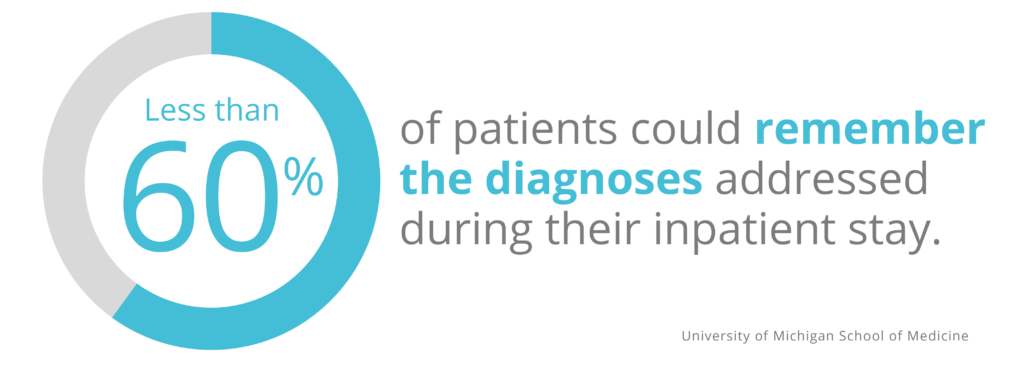Amanda Hannan
May 2 2023
Amanda Hannan
May 2 2023
Reading Time: 3 minutes
Healthcare providers are no strangers to forgetful patients, as it has long been a problem for patients to retain care information once they leave the hospital’s four walls. But while many providers have tools in place to address this challenge, they often fall short.
In a study conducted by the University of Michigan School of Medicine, 53 patients were interviewed in the days following their discharge from an inpatient encounter. Researchers found that patients need better education through tools like digital communication and portal access.
In this blog, we explore the research results and how the right technology can help improve education for patients receiving care outside of the hospital.
90% of patients were confident they could remember details from their patient stay.
Even though some inpatient facilities provide whiteboards to display medical information, patients reported that they were unhelpful in helping retain information. Instead, they preferred paper and pens at the bedside to take notes. But what if those manual recording tools got left behind or lost after discharge? With the right digital solution, patients have 24/7 access to real-time information and education on their preferred device.

Less than 60% of patients could accurately remember the diagnoses addressed during their inpatient stay.
Most patients may be confident in their ability to remember medical information given during their inpatient stay, but the reality is that only a little more than half can accurately retain that information after discharge. This lack of retention can negatively impact patient outcomes or even lead to a readmission. With collaborative care technology, patients can receive up-to-date patient education on their diagnosis anywhere, any time — helping to ensure patients adhere to their treatment plans.

Less than 45% of patients could remember medication changes that happened during their impatient stay.
While just a little over half remember diagnoses, less than half remember medication changes — a critical part of treatment after their inpatient stay. It’s also common for clinicians to find boxes of medications when visiting patients in the home, reconciling what’s newly prescribed and what’s old. With digital tools that prioritize real-time patient communication and collaboration, patients have access to education on their medication changes, dosage amounts and side effects.

Patients mentioned patient-provider communication as being helpful for information retention.
With so much confusion on diagnoses and medication information after inpatient stays, it’s no surprise that the study found patients find communication helpful for retaining information. Providers that adopt collaborative technology not only set patients up for success, but also help to increase patient engagement and satisfaction.
The numbers are clear, patients need better tools to adhere to their care plans. With the right technology, education can be on demand 24/7 to provide real-time and up-to-date information on diagnoses, medications and treatments — ultimately helping patients have more positive care experiences.
Talk to a CitusHealth expert to learn how our digital solution helps to keep patients informed on their diagnoses and care plans.